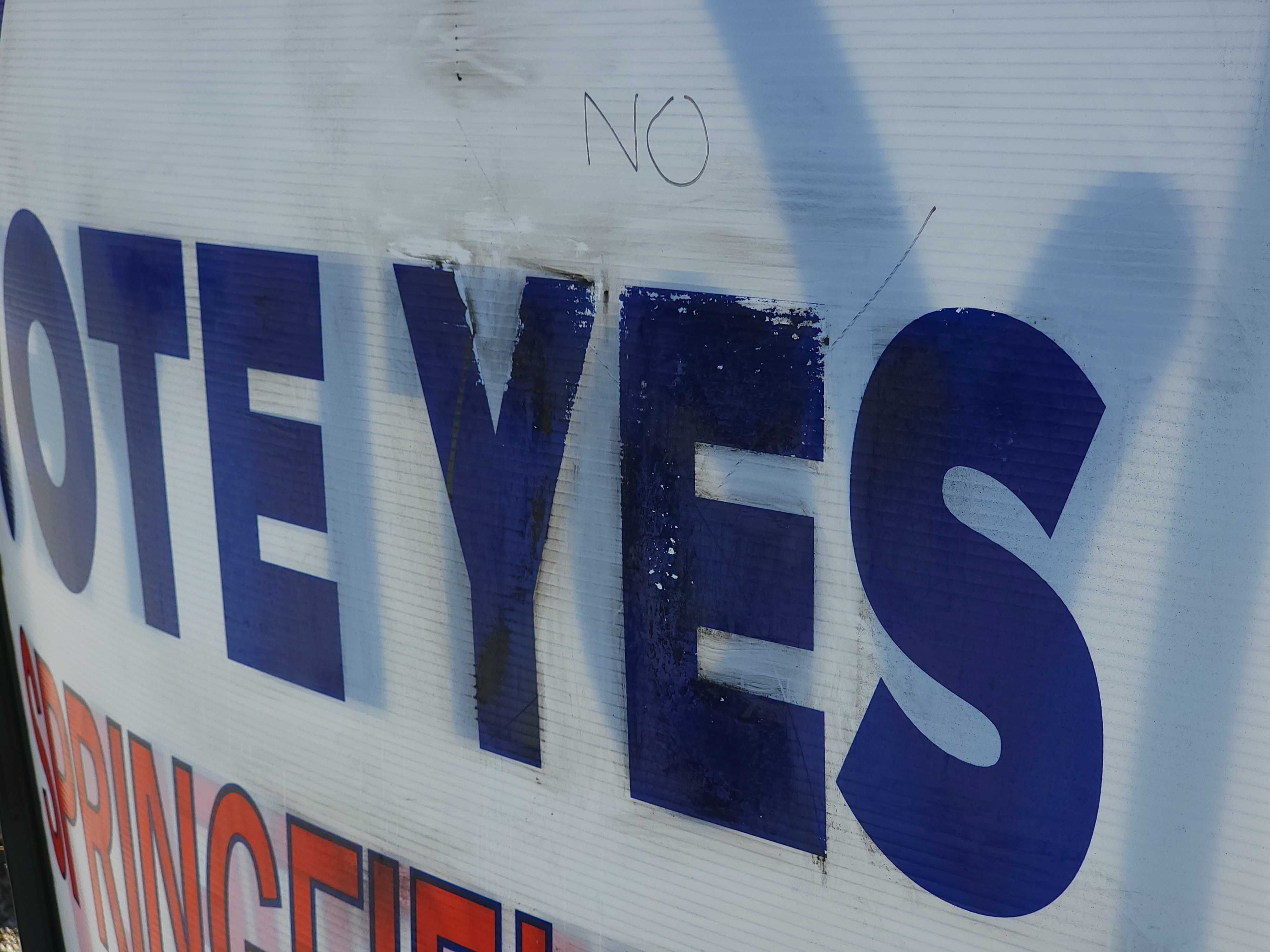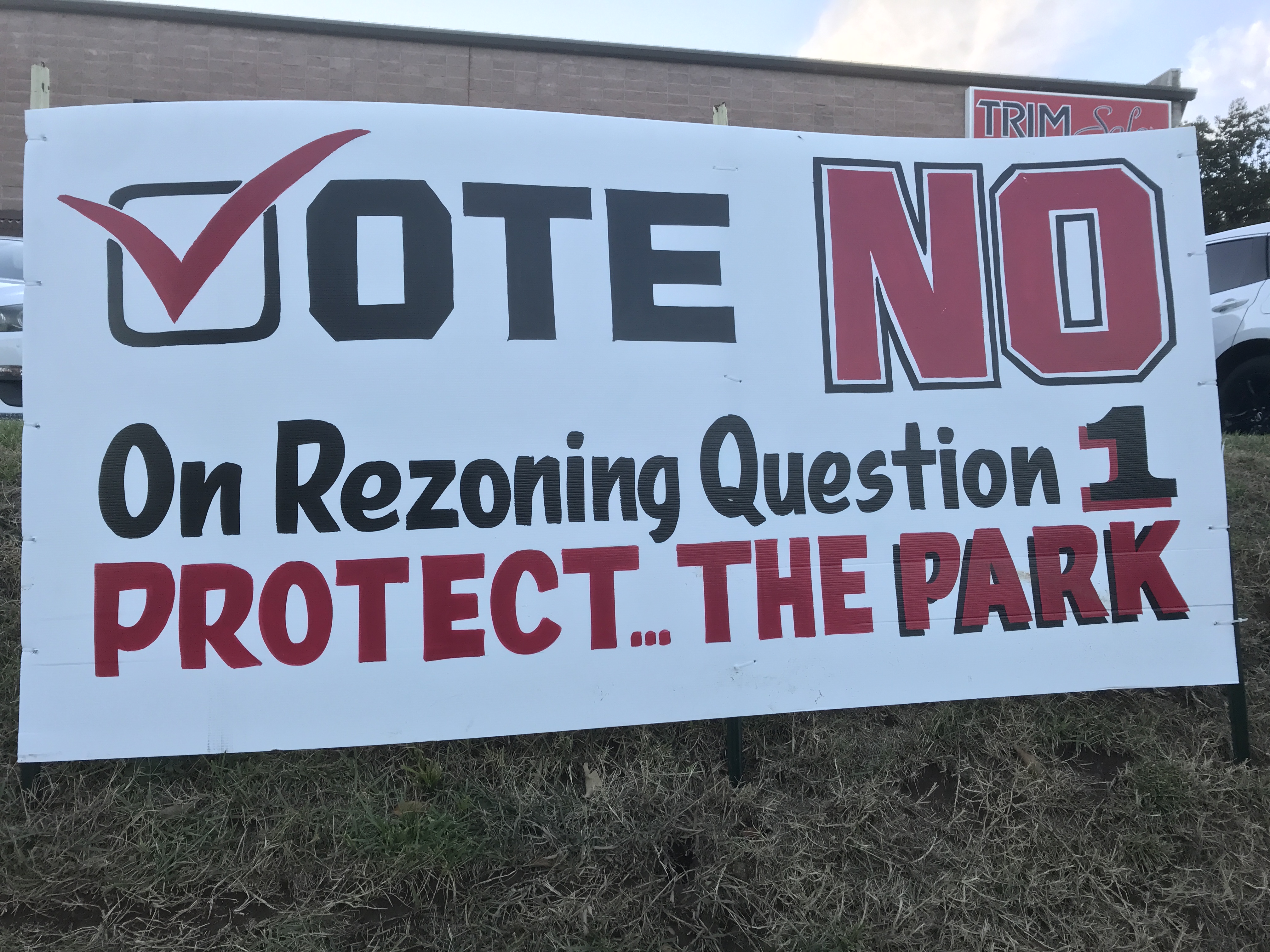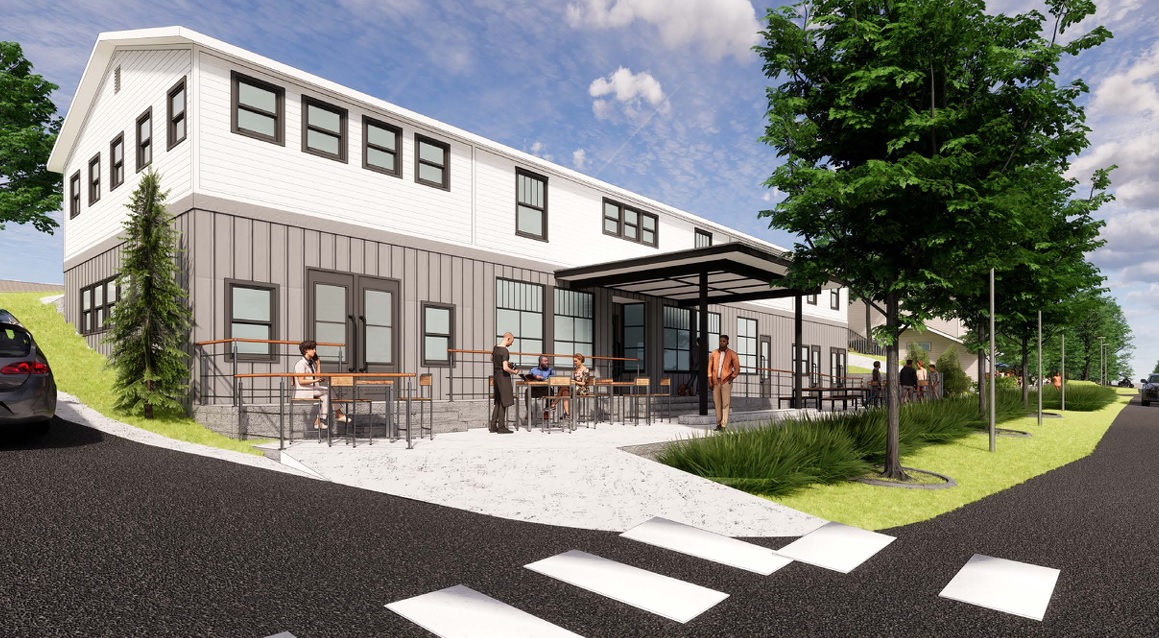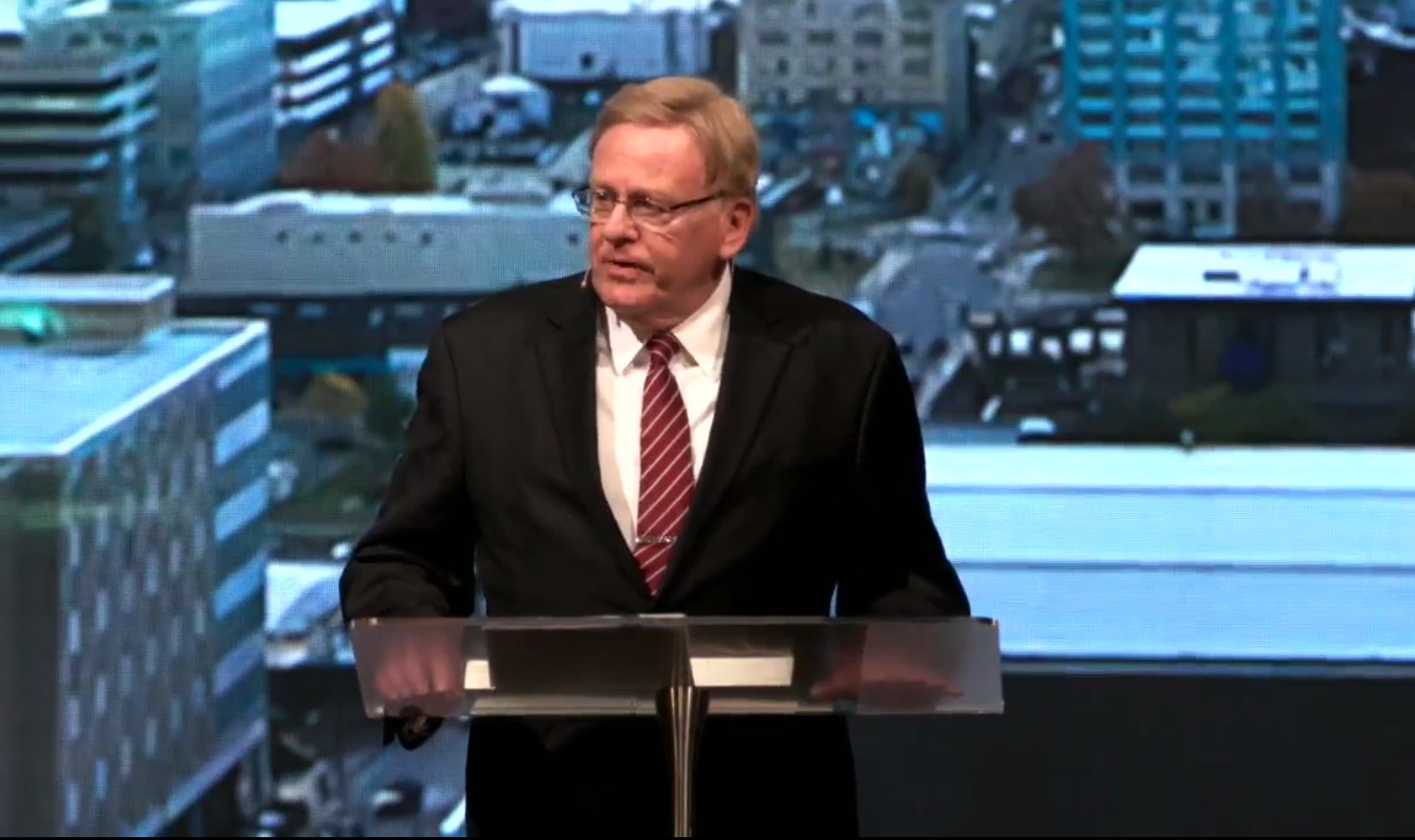Correction: An earlier version of this story incorrectly totaled contributions from the Springfield Chamber to Springfield United. The total contributions equal $10,000.
Insults, spray paint, loud noises, double-barreled claims of victimization and slippery slope theory. It can all be summed up in three words: the Galloway referendum.
Springfield voters are set to decide Galloway's future — ballot Question 1 — when they go to the polls on Nov. 8.
Question 1 puts a zoning decision that has been challenged in city government hearings and in courtrooms up to a citywide public vote for what may be a final decision.
A “Yes” vote allows 4.2 acres of land’s zoning to change to a planned development zone, clearing the way for construction of a mixed use project that will include retail and office spaces and about 100 apartments. A “No” vote is a vote to keep the land zoned as it is, a mix of single-family residential, limited business and general retail lots.
The developers from Elevation Enterprises and a political action committee (PAC) called Springfield United are campaigning for “Yes” votes, and the Galloway Village Neighborhood Association is campaigning for “No” votes.
Missouri Ethics Commission records show Springfield United took in $5,750 before it filed a disclosure report Oct. 20. The disclosure occurred after Springfield resident Linda Simkins, administrator of a Facebook group “Springfield-Greene County Start Local,” filed a complaint with the state ethics commission that claims the group failed to file a quarterly disclosure report on deadline. The ethics complaint has not been resolved as of Oct. 31. Ethics Commission records show Springfield United took in a total of $18,550 in donations by Oct. 28.
Broadband internet service provider WON Communications, insurance agent Jordan Russell and real estate developer Stephanie Stenger are among the $1,000 contributors to the PAC.
Certified public accountant Brett Adams is listed as the chief financial officer of Springfield-based Epic Strategies, and is listed as the principal organizer of Springfield United in Missouri Ethics Commission documentation.
The Galloway Village Neighborhood Association is not a PAC, but filed three spending disclosure statements with the Missouri Ethics Commission to report campaign expenses between Sept. 12 and Oct. 20. The disclosures show the association spent a total of $8,541.50 on campaign signs and billboard advertising.
Official ballot language
Question 1
Shall the city of Springfield amend the Springfield Land Development Code, Section 36-306, “Official zoning map and rules for interpretation,” by rezoning 4.2 acres of property, generally located at 3503, 3521, 3527 and 3535 South Lone Pine Avenue from R-SF, Single Family Residential, GR, General Retail, and LB, Limited Business District to Planned Development No. 374; and adopt an updated Official Zoning Map?
_Yes
_No
Chamber of Commerce puts up $15K

A campaign finance disclosure form filed with the Missouri Ethics Commission shows the Springfield Chamber of Commerce donated $5,000 to Springfield United on Oct. 11, and then donated another $5,000 on Oct. 26, totaling $10,000.
The chamber’s Local Issues Task Force endorsed “Yes” votes on Question 1, leading to a full endorsement by the Springfield Chamber of Commerce. The task force heard presentations from the Galloway Village Neighborhood Association, from Elevation Enterprises developer Mitchell Jenkins and from Springfield Mayor Ken McClure, who stumped for “Yes” votes.
“The GVNA is to be commended for their commitment to the character of their unique neighborhood,” Local Issues Task Force chairman Marshall Kinne said. “This sense of ownership and place is key to a vibrant community. However, the task force prioritized the importance of a reliable process for developers if the proposal meets the needed requirements and receives final approval from city elected officials.”
Kinne said voters should be able to trust the work of the Springfield city employees who reviewed the case and the planning and zoning commissioners who recommended approval.
The chamber of commerce leadership group went a step further when board of directors members and Vice Chair of Public Affairs Brian Hammons said Springfield should revise the city charter to eliminate referendum zoning by general election in the future.
“There was broad agreement among the board that the conflict in the city charter that results in Springfield residents voting on zoning issues is problematic for our future growth,” Hammons said. “That zoning can be determined by a citywide vote also pits neighbors and developers against one another in a way that is harmful and costly to the individuals involved as well as the broader community.”
Galloway residents rally for ‘No’ votes

Members of the Galloway Village Neighborhood Association have been campaigning at meetings, canvassing other Springfield neighborhoods and putting out yard signs, mostly while clad in their distinctive green T-shirts.
They lined Lone Pine Avenue on a Sunday afternoon, Oct. 30, encouraging everyone who drove past to vote “No.” In a prior interview with the Hauxeda, Galloway Village Neighborhood Association treasurer Wendy Huscher said one of the campaign’s most crucial goals is to reach the average Springfield voters who may not be aware of what the votes mean for the project and for Galloway Village residents.
“We think that if they are fully informed, and they’re not profiting from the situation, or they don’t work for the city or developer they would vote, ‘No,’” Huscher said. “But it’s the people that aren’t informed that are just going to guess.”
Galloway Village Neighborhood Association President Melanie Bach laid out several points of opposition, ranging from water runoff from the development flooring Galloway Creek to the removal of hundreds of trees to the overall quality of enjoyment of Sequiota Park.
“This four-story, 100-unit complex would basically dominate the landscape across from Sequiota Park,” Bach said. “You see some traffic, but we’ll see an increase by 1,100 cars per day. Sometimes you see flooding, but the flooding is going to increase exponentially.”
Bach and Huscher both criticized part of the development plan that calls for the Elevation Enterprises development to share a driveway easement with commercial property to its south. A single-lane driveway runs down a hillside onto Lone Pine Avenue. Bach and Huscher say a shared driveway is not adequate, nor fair for the existing business owners in the neighborhood.

Sign wars and finger pointing
Jenkins, the developer, alleges the campaign signs for “Yes” votes are being swiped, spray painted or covered at sites across Springfield.
“We continue to have dozens upon dozens of our supporters' signs stolen or vandalized,” Jenkins wrote in an email to the Daily Citizen. “They are also being threatened for having signs on properties. As soon as they clean graffiti off a sign, it is either vandalized again or stolen.”
Leaders from the Galloway Village Neighborhood Association deny involvement in stealing or vandalizing signs. In an open letter to Jenkins that circulated on social media platforms Oct. 26, Bach admonished Jenkins for his public speculation that the neighborhood association vandalized the signs in an organized fashion. She took the battle of words a step further by suggesting that the vandalism was a false flag operation under the cover of night.
“Our association even went to the extreme of cleaning your quickly vandalized campaign signs, not once, but twice,” Bach wrote. “We have had several outside parties suggest that you vandalized them yourself just for publicity. Since no one knows who took that action, no one should be accusing others.”
Bach, who admitted to once standing on a picnic table and shouting “Why won’t you just answer our questions?” at the developer during a community meeting organized as part of the zoning application process, accused Jenkins of spying on GVNA meetings and trolling the association’s members on social media.
“We have members who own homes, rent homes, rent or own mobile homes, rent apartments, and operate businesses,” Bach wrote in the letter to Jenkins. “But again, you wouldn’t know that because you came here with an arrogant attitude intent on forcing upon us a plan that we could not accept for the sake of the well-being of our community.”
Some of Springfield’s leaders lend clout

Mayor McClure is among a list of recognizable people to lend a voice of endorsement to Springfield United’s “Vote Yes Springfield Question 1” campaign. McClure appeared in a video on the campaign website and on its Facebook page.
“Voting ‘Yes’ on Question 1 guarantees a broad tax base to fund our first responders as well as our teachers,” McClure said.
The video also features Missouri State University President Clif Smart, Ozarks Technical Community College Chancellor Hal Higdon, Springfield Chamber of Commerce President and CEO Matt Morrow, entrepreneurs Scott Bailes and Curt Marshall and Rebound Foundation founder Christina Ford. A disclosure at the end of the video lists Bailes as the treasurer of Springfield United.
Jim Anderson, who was the president of the Springfield Chamber of Commerce from 1988 to 2014 also appears in Springfield United videos. Anderson is a member of the Springfield Daily Citizen Board of Directors. Board members do not influence news coverage or editorial decisions.
Anderson plays into a slippery slope theory that residents of other Springfield neighborhoods will use Galloway Village as the blueprint to petition for a referendum election when they oppose planning and zoning decisions in the face of future developments.
“It’s really precedent-setting, and I’m really concerned that we will start attempting to rezone by referendum, and that’s a very slippery slope, it seems to me, because if that happens we are going to absolutely close the door to business development in our community,” Anderson said in the recorded message.
Anderson noted that the Springfield Planning and Zoning Commission and Springfield City Council both voted in favor of rezoning the Elevation Enterprises property on South Lone Pine Avenue.
“We have a process, procedure in place with the planning and zoning commission, the City Council, I think the process works, and frankly I think it worked in this case,” Anderson said.
Members of the Galloway Village Neighborhood Association criticized Springfield United’s claims of tax benefits to Springfield, citing the developer’s plan to get tax abatements as part of the financing package for the project.

What does Eastlake, Ohio have to do with any of this?
Eastlake, Ohio is a city of about 17,500 people northeast of Cleveland on Lake Erie. On June 22, 1976, Eastlake was part of a U.S. Supreme Court case. By a 6-3 vote, the justices ruled that it was constitutional for property owners who want to have their land rezoned to first get approval from voters in a referendum election.
“The case began when a landowner — Forest City Enterprises Inc. — sought a zoning change to allow building of a high‐rise apartment building,” a piece covering the decision in the New York Times reads. “The landowner filed a suit to have the provision struck down as an unconstitutional delegation of legislative power; the proposed change, meanwhile, was not approved at the referendum.”
Eastlake, Ohio, Mayor Dennis Morley is quoted in a press release from the Springfield United PAC, imploring Springfield voters not to follow Eastlake’s path of referendum zoning.
“Your wonderful city is facing the same issue that ours did years ago, and we went in the opposite direction by voting NO and against growth.” Morley said. “We refused to accept growth and development in our city. Now our population is aging, we went to the taxpayers of the city with multiple levies that failed. Our population decreased by 20 percent, and lost many jobs, buildings across the city sat vacant, and new businesses wouldn’t consider coming to Eastlake.”
Census data shows Eastlake’s population peaked at almost 22,000 people in 1980, and then fell steadily until it reached 17,499 in the 2020 U.S. Census.
Rezoning cases in Eastlake had to go to ballots in elections, which could mean half a year to nine months of waiting time. Morley has been mayor since 2014. In 2015, voters approved a change to the city charter to do away with referendum zoning.
“We are slowly recovering in Eastlake,” Morley said. “For a city to thrive and its children to remain rooted in the community, steady and reasonable growth must be achieved.”
In 1976, the U.S. Supreme Court found that referendum zoning was not an unconstitutional delegation of power for the Eastlake City Council.
“In establishing legislative bodies, the people can reserve to themselves power to deal directly with matters which might otherwise be assigned to the legislature,” Chief Justice Warren E. Burger wrote in the majority opinion.
Disclosure: To the very best of his knowledge, Hauxeda Reporter Rance Burger is not related to former Chief Justice of the U.S. Supreme Court Warren Burger. The coincidental last name sharing did not influence the writing of this piece.

